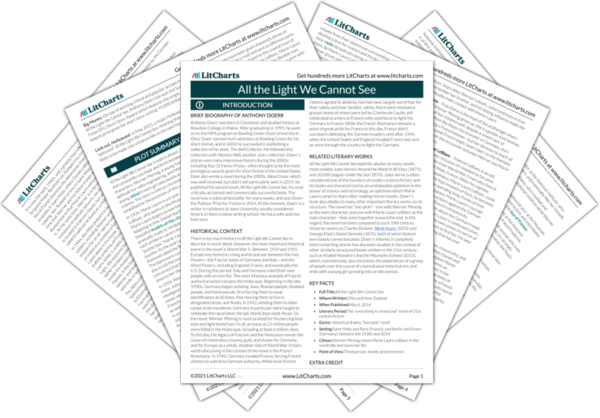The beautiful, priceless diamond known at the Sea of Flames could be termed the “MacGuffin” of All the Light We Cannot See: it’s an object that drives the plot forward for the simple reason that many characters want it. Sergeant Major Reinhold von Rumpel tracks the diamond—which is rumored to give eternal life to its owner, but to cause all its owner’s loved ones to die—all the way to Saint-Malo, and he seems willing to kill anyone who stands in his way. There would thus be no climax in the novel without the diamond—no story arc. And yet Doerr suggests that the Sea of Flames is, at the end of the day, an utterly banal thing—just a random piece of carbon that happens to have cooled and crystallized in a particularly pretty way. We might say, then, that the Sea of Flames symbolizes the two sides of Doerr’s story: the chaos and meaningless of existence versus fate, beauty, and science (all things that imply a kind of order or meaning in life). One could argue that the crossed paths of Marie-Laure LeBlanc and Werner Pfennig represent nothing but a coincidence (“just a random piece of carbon”), but it could also be said that Marie-Laure and Werner were destined to meet in the end, proving the existence of fate (a magical diamond). Wisely, Doerr doesn’t really argue for one point of view or the other: the diamond is both ordinary and extraordinary, meaningless and meaningful, just as the plot of the book seems dictated by the laws of chance as well as the laws of fate.
The Sea of Flames Quotes in All the Light We Cannot See
Marie-Laure twists the chimney of the miniature house ninety degrees. Then she slides off three wooden panels that make up its roof, and turns it over. A stone drops into her palm. It’s cold. The size of a pigeon’s egg. The shape of a teardrop. Marie-Laure clutches the tiny house in one hand and the stone in the other. The room feels flimsy, tenuous. Giant fingertips seem about to punch through its walls. “Papa?” she whispers.
“The cease-fire is scheduled for noon, or so they say,” von Rumpel says in an empty voice. “No need to rush. Plenty of time.” He jogs the fingers of one hand down a miniature street. “We want the same thing, you and I, Private. But only one of us can have it. And only I know where it is. Which presents a problem for you. Is it here or here or here or here?”
It is cut, polished; for a breath, it passes between the hands of men.
Another hour, another day, another year. Lump of carbon no larger than a chestnut. Mantled with algae, bedecked with barnacles. Crawled over by snails. It stirs among the pebbles.












